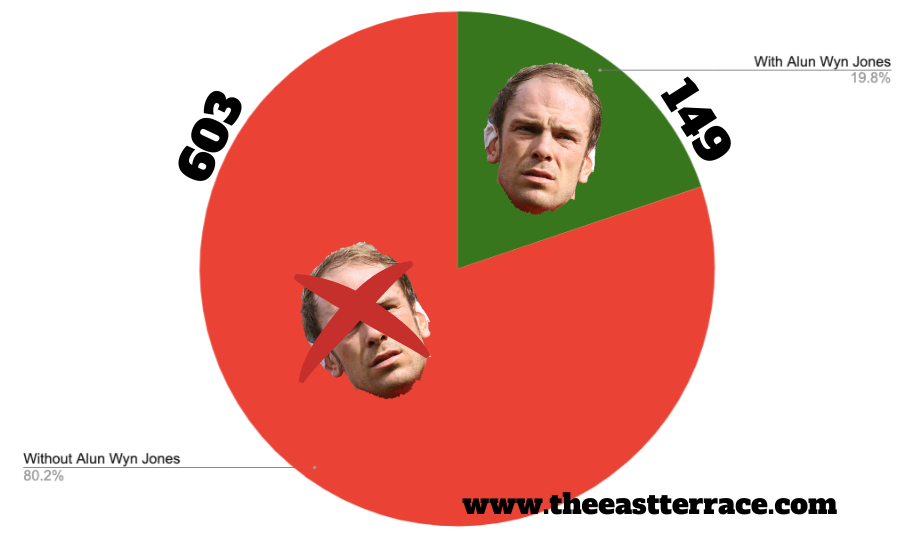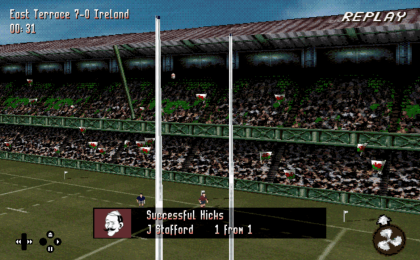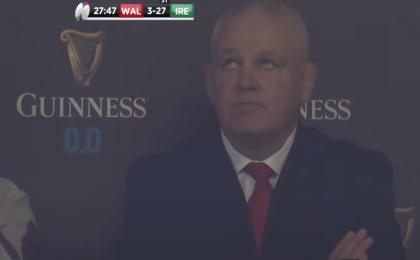Last Saturday Alun Wyn Jones won his 149th Welsh cap. The number took him past New Zealand’s Richie McCaw to make him the most capped player for one team in the history of international rugby. Jones has also won a dozen caps in total for the British and Irish Lions, meaning his total international appearances come to 161.
Cruelly, a shoulder injury has ended his autumn campaign. It also most likely ended his Six Nations chances too. The second row is destined to go under the surgeon’s knife one short of a nice round 150 Welsh caps.
While undefeated Father Time may be tugging ever harder on Jones’ Macron coattails, it wouldn’t be wise to rule him out coming back and not just making that 150, but exceeding it. Welsh coach Wayne Pivac has said he sees the 2023 World Cup as a possibility for the Ospreys veteran.
 Testing times
Testing times
For rugby historians and stat nerds, one of the fascinating subplots of Jones’ career is how it illustrates the dramatic increase in Test matches in the modern era. Legendary Welsh full-back Billy Bancroft won 33 consecutive caps for Wales. His first came in 1890 and his last in 1901. While the only opponents in that period were England, Ireland and Scotland, Bancroft grabbed every cap he possibly could.

When rugby entered the professional era in 1995, JPR Williams was the most capped player in Welsh history with 55 caps earned between 1969 and 1981. It was an extraordinary figure at the time with Wales usually playing only four, maybe five games a year on average. Four games would come in the Five Nations and there may (or may not) be one other game against a touring side. Caps were only awarded against the Home Unions, France, New Zealand, South Africa and Australia. So even if the odd match did take place against the likes of Fiji, Japan or Argentina, they were not given Test match status. This state of affairs didn’t really end until the 1990s.
Even as late as 1999 Wales were still occasionally (and randomly) choosing not to give caps for certain one off games such as the USA (despite having done so previously when playing the Americans). And of course, the WRU has continually changed the status of matches against the Barbarians. Four times the fixture has seen caps awarded and on six other occasions sense prevailed and none were given.
Wales had never even played a capped match outside of Europe until their 1964 trip to South Africa. This was ‘quickly’ followed by a 1969 trip to New Zealand and Australia. Now of course, no one blinks if Wales play a dozen plus games a year.
None of this, of course, takes away from Alun Wyn Jones’ extraordinary record. To keep form, focus and fitness in the brutal and relentless world of modern rugby is both admirable and astonishing. It does also lead to some extraordinary statistics and slices of trivia.
- Wales’ first international took place in 1881 and it was not until the 1930 French match that Wales’ 149th Test took place (that’s 49 years). Alun Wyn Jones has won his 149 caps between 2006 and 2021.
- Alun Wyn Jones has played in 19.8% of all Welsh Test matches since 1881.
- Alun Wyn Jones has been involved in 18.8% of all Welsh international wins since 1881.
 The 100 club
The 100 club
For the record, here’s a breakdown of when Wales played milestone ‘centenary’ matches:
- 1st match – 1881: England (away). Captain: James Bevan
- 100th match – 1914: Scotland (home). Captain: Rev Alban Davies
- 200th match – 1951: France (away). Captain: Jack Matthews
- 300th match – 1973: France (away). Captain: Gareth Edwards
- 400th match – 1991: France (away). Captain: Paul Thorburn
- 500th match – 2001: Japan (away). Captain: Andy Moore
- 600th match – 2009: USA (away). Captain: Ryan Jones
- 700th match – 2017: Tonga (neutral venue). Captain: Jamie Roberts
Here’s to hoping Jones’ shoulder allows him to lift several more caps yet onto his extraordinary head.
Want more stuff like this?
If you like this kind of stuff, you’ll probably enjoy James Stafford’s ‘An Illustrated History of Welsh Rugby: Fun, Facts and Stories from 140 Years of International Rugby’, published by Polaris. Grab your copy here.




